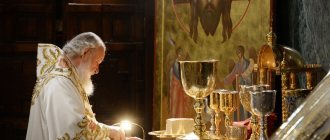— There is an ancient church rule that prohibits the presence of unbaptized and unchurched people at the main part of the main Orthodox service - the Divine Liturgy, when the rite of transubstantiation of the Holy Gifts and the sacrament of Holy Communion are performed. The meaning of such a prohibition was so that the church sacrament would not become a reason for misunderstanding or profanation on the part of external, non-church people. Now, when worship is the most effective way of preaching that exists in the Orthodox Church, it is probably impossible to talk about the need for unconditional compliance with this ancient prohibition.
If an unbaptized person, out of curiosity or other good motives, feels the desire to come to church, then he can calmly go there. It’s just that when you are in a church during a service, it is better for an unbaptized person not to go forward, not to expose himself, so as not to unwittingly confuse the parishioners with ignorance of basic actions. It’s better to stand somewhere aside, where you yourself won’t be embarrassed by the fact that others are paying attention to your ignorance. If a person is not baptized, then he should not apply the sign of the cross to himself. There is also no need to strive to evoke in yourself any exalted feelings of tenderness or inspiration. We must try to stand quietly and calmly during the service and listen carefully to how the soul and heart respond to what is happening in the church.
Icons of the Virgin Mary
Starorusskaya (celebration on May 17)
“Starorusskaya” is one of the famous Mother of God icons associated with the Novgorod land. The celebration in honor of this icon takes place on May 17, the day of its appearance and the creation of miracles in Tikhvin (1570). According to folk legend, the icon was brought to Staraya Russa from the Greek city of Olviopolis at the end of the 10th century. The beginning of her creation of miracles is associated with the times of Ivan the Terrible. Around 1570, a pestilence raged in the northern countries. According to revelation, one pious resident of Tikhvin, in order to get rid of this deadly epidemic, needed to “exchange” the revered icons of Tikhvin and Staraya Russa. Then the Rushans gave their icon of the Mother of God to Tikhvin, and the Tikhvin people sent one of the copies of their shrine - the Tikhvin Mother of God - to Staraya Russa. The residents of Staraya Russa wanted to return their shrine to themselves. Around 1787, they sent intercessor Ilya Krasilnikov to the Tikhvin residents for the icon. Having received a refusal in Tikhvin, Krasilnikov ordered an exact copy of the Old Russian icon, which was brought to the Cathedral of the Transfiguration Monastery of Staraya Russa on May 4 (17 New Style).
Over time, this copy became famous for working miracles, repeatedly demonstrating healing powers. However, the residents of Staraya Russa did not lose their desire and hope to return the shrine itself, and in 1805 their famous litigation with the Tikhvinites began, which lasted more than 80 years. The Tikhvin residents did not want to cede the shrine, they argued their refusals by the lack of reliable written evidence about the ownership of the icon to Staraya Russa and pointed to the length of the icon’s stay in Tikhvin, and as proof of their deep veneration of the icon they cited descriptions of the incredibly rich setting of the Staraya Russa icon, made by the diligence of the Tikhvin merchant couple Klimov in the end XVIII century. In 1854 - 1855 Archimandrites Peter and Vladimir are making a new luxurious silver-gilded chasuble, demonstrating care for the revered image. However, the residents of Staraya Russa persistently demanded the return of the icon, which they considered theirs. Finally, in 1888, by order of the Synod, the revered icon was solemnly carried by hand from Tikhvin to Staraya Russa, and placed in the Cathedral of the Transfiguration Monastery. An exact copy of this icon remains in Tikhvin. In 1891, the Church of the Old Russian Icon of the Mother of God was completed, at the consecration of which John of Kronstadt himself was present. With the advent of Soviet power, the icon, according to local residents, was “ruined”, silver and jewelry were removed from it, and transferred to the local history museum. In August 1941, during the occupation, the icon disappeared and has not yet been found.
- Yulia Klimycheva
- Amurskaya Pravda dated 05/17/2008
When to come
An unchurched person can visit the temple at any time when he has a desire to do so. It is not written anywhere that it is necessary to have special permission for when and how to communicate with God or simply visit a church, as a monument or attraction (as many tourists do). The only condition is that it is still undesirable to attend the liturgy (morning service). But if a person does not know about this or has sincere thoughts (it does not come as a test: what will happen if I break the rules?), then everything is forgiven to him.
Other Church Rules Concerning Unbaptized Christians
It is noted that Orthodox believers quite often ask some other questions that concern unbaptized Christians. Thus, according to statements by clergy, the topic of whether it is possible to pray for living people who have not yet taken part in Baptism is raised quite often. So, according to numerous statements, this can and even should be done. However, it is important to understand how an unbaptized person himself relates to prayers.
According to church rules, Christian believers can pray for any people who ask them to do so. It is not right to make this decision on your own. The same rule applies to unbaptized people who have died. Thus, you can pray for departed Christians both at home and on church grounds, alone or during a general worship service.
The Orthodox Church does not allow funeral services for Christian believers who were not baptized during their lifetime. This is due to the opinion that the Lord has endowed each person with his own worldview. If during his lifetime he did not want or did not have time to fully reunite with Christians, then this was his will, and he is not allowed to contradict it even after his death.
What do we have to do?
An unbaptized person can safely take part in the life of the temple:
- touch sacred objects;
- venerate icons;
- kiss the cross;
- leave health notes;
- leave funeral notes;
- pray;
- men should remove their hats when entering the church;
- Women should cover their heads with a headscarf or scarf.
Children's help around the house is more important than just work: parents' mistakes
A beautiful wicker basket made from old bags: it looks great in the interior
KAMAZ and alternative energy sources: development of hydrogen vehicles is underway
It should be remembered that the Lord is merciful, therefore he allows you to do whatever your soul desires. If you treat the church with respect, much will be forgiven.
Is it possible for unbaptized people to give notes, pray and light candles?
Photo: Flickr.com
“I don’t see a sin in an unbaptized person lighting a candle, making the sign of the cross with reverence, or venerating an icon or holy relics,” says priest Sergei Vasin. If a person is going to be baptized, then he goes through a catechumen - a period of preparation for the Sacrament of Baptism.
In the first centuries of our era, the catechumen could last a year or longer, so the catechumen can be anointed with consecrated oil, submit notes about the baptized living and deceased, drink holy water, and venerate shrines. In the Russian Orthodox Church there is a special prayer for people preparing for Baptism - the litany of the catechumens.
Priest Alexander Savin warns that a person who wants to be baptized must be “consistent and purposeful, try to realize his intention without delay.” Since demons do not sleep, some obstacles (temptations) may arise on the path to Baptism. Superstitious people may consider such circumstances to be “signs” and, attaching significance to them, postpone Baptism.
In one of the ancient patericons there is a legend about a non-Christian who decided to “test” Orthodox Christians through participation in the Sacrament of the Eucharist. The man, along with other communicants, approached the Chalice with the Holy Gifts, but when the priest handed him a spoon with the Body and Blood of Jesus Christ, the gentile saw real blood and a piece of meat on it.
What can't you do?
First of all, you need to overcome your fear. You should not be afraid under any circumstances, since only brave people will inherit the Kingdom of Heaven (this is the conclusion of Hieromonk Job (Gumerov). It is not advisable to perform the following actions:
- To talk loudly;
- laugh;
- run;
- hustle;
- women should enter the temple in too revealing outfits;
- men should wear shorts to church;
- behave disrespectfully:
- sign oneself with a cross (to be baptized);
- pray for unbaptized people (this must be done at home).
If you follow all the rules, but inadvertently cross yourself, this will not be considered a grave sin, since this action is your sincere impulse.
How should unbaptized people behave in church?
How can or should an unbaptized person behave in church? Even before being baptized, can I turn to God in prayer and sign myself with the cross? - such questions are often addressed to the priest. Archpriest Evgeny Golubev answers.
It is known that for the first time we all go to church unbaptized, so the Church does not object to an unbaptized person coming to church. You cannot ask a person to leave the church and ask him why he should go to church if he has not been baptized. On the contrary, an unbaptized person should be helped to come to God, and not driven away from Him. Another question is whether he can participate in church rites and sacraments? You can pray for an unbaptized person yourself; private prayer for such people is not prohibited, but you cannot submit a note for the liturgy either for a living unbaptized person or for a deceased person.
Unbaptized people can visit the temple, light candles, venerate holy relics and icons, if they have faith and reverence for the shrine. Unbaptized people can attend services, read prayers, listen to the Gospel and its interpretation. Otherwise how will they know about God? Going to church helps us become different, become a new person. Without the Church this is impossible. All talk about goodness and truth without God is empty chatter...
There is an ancient church rule that prohibits the presence of unbaptized people at the main part of the main Orthodox service - the Divine Liturgy, when the Translation of the Holy Gifts and the Sacrament of Holy Communion are performed. The unbaptized (catechumens) could only attend the first part of the liturgy, which is called the liturgy of the catechumens. It focuses on the reading of the Gospel and the sermon, which in those days was most often delivered precisely after the Gospel reading, and an explanation of the basic tenets of the faith, which were especially important for the catechumens.
Soon after reading the Gospel, the deacon exclaimed: “Come out, you catechumens...”, i.e. “Come out, you catechumens,” and those preparing for baptism left the temple. The meaning of such a prohibition was so that the church sacrament would not become a reason for misunderstanding or profanation on the part of external, non-church people.
It should also be noted that the catechumens, or catechumens, were divided into three degrees:
— The first degree was made up of listeners, that is, those who declared a desire to join the Church and received the right to enter the temple to listen to the Holy Scriptures and teachings.
— Catechumens of the second degree, falling or kneeling, had the right to be present in the temple during the entire liturgy of the catechumens.
— The third degree of catechumens were those who demanded, that is, those who were ready to receive the sacrament of baptism. They were informed of the most important part of Christian teaching - about the Holy Trinity, about the Church, etc. Before Easter, those who wished to be baptized added their names to the list of those being baptized, and this saving sacrament was performed over them on Holy Saturday.
Today, Orthodox worship has the same structure as in ancient times. But there is virtually no institution of catechumens in the modern Orthodox Church.
Now that worship has become the most effective way of preaching in the Orthodox Church, it is probably impossible to talk about the need to unconditionally observe this ancient prohibition. If an unbaptized person, out of curiosity or other good motives, feels the desire to come to church, then he can calmly go there. It’s just that when you are in a church during a service, it is better for an unbaptized person not to go forward, not to expose himself, so as not to unwittingly confuse the parishioners with ignorance of basic actions. It’s better to stand somewhere aside, where you yourself won’t be embarrassed by the fact that others are paying attention to your ignorance.
Also, you should not strive to evoke in yourself any exalted feelings of tenderness or inspiration. We must try to stand quietly and calmly during the service - and listen carefully to how the soul and heart respond to what is happening in the church.
It is important to note that those who are not baptized cannot take part in the sacraments of the Church. They cannot confess and receive communion, be godparents at the baptism of another person, receive unction, or get married. An unbaptized man cannot become a priest. However, those who are not baptized can come up for anointing during the evening service. There will be no harm to an unbaptized person from being anointed with blessed oil. But you just have to think about whether it will be useful for him.
If a person approaches the church fence, if he, having not yet decided to be baptized, shows interest in these actions of the Church, then this is good. And if he perceives such actions as some kind of “church medicine”, but at the same time the person does not at all strive to join the church in order to become an Orthodox Christian, and believes that the anointing will serve him as some kind of amulet, then in this case it is better not to approach.
Therefore, there is a clear answer to the question “can an unbaptized person go to church?” - "Yes! Maybe!" One of the purposes of man on earth is to glorify God, his Heavenly Father. This glorification is most fully expressed in the majestic services of the Church. In the Church, people find fullness of mutual prayerful communication and mutual prayerful support.
The Lord said: “If two of you agree on earth to ask for anything, then whatever they ask will be done for them by My Father in heaven, for where two or three are gathered in My name, there I am in the midst of them” (Matthew 18). :19-20). The Apostle Paul calls the Church “the Body of Christ, the fullness of Him filling all in all” (Eph. 1:23), as well as “the house of God,” “the pillar and ground of the truth” (1 Tim. 3:15). The Church is a support for Christians, the guardian of truth. Without the Church and participation in the Church Sacraments, it is impossible for a person to be saved. Anyone who does not visit the temple is actually outside the Church. Therefore, it hurts not when unbaptized people come to church and, out of ignorance, do something wrong, but when baptized people come there once a year, only to bless water or Easter cakes.
Archpriest Evgeny Golubev Source: Gorlovka and Slavic diocese
Viewed (57) times
Share:
Who to turn to for help
If you have some questions, you need to seek help from the churchwomen. These women usually sit at the entrance to the temple at the counter where candles are sold and prayer notes are accepted. You can also be helped by workers who keep the cathedral clean and look after the candles (putting away those that have already burned out enough and clearing space for new ones). These people will tell you where this or that icon is located, who should pray for health or repose, and will also answer other questions that interest you. If you require more detailed information (for example, personal questions), please contact the priests. Remember that churchgoers welcome any person who crosses the threshold of the temple of his own free will.
Prot. Andrey Lorgus: There is no clear answer to the question about the posthumous fate of unbaptized babies
A tragic accident, as a result of which a two-month-old child was injured, occurred in St. Petersburg on the morning of November 23.
The family was driving to church to baptize their child; on the way, the car was involved in a minor accident. The woman was holding her son in her arms and did not see him hit during the accident.
The priest, taking the child in his arms, realized that the baby had died, after which he called an ambulance to the temple. The doctors were unable to help the baby.
reflects :
“The fact that the Lord is merciful and He himself knows how to deal with every person is understandable. But the fact is that in the Lenten Triodion on Meat Saturday there is a synaxarion - this is a reading that was offered in monasteries between Vespers and Matins, or on the canon between 6 and 7 cantos - in which the issue of various kinds of funeral customs and understandings. And it says that unbaptized babies will go to hell fire. This was often rewritten and voiced.
That is, this is not just someone’s invention, but in some church books there really is such an opinion and this is a fact.
The problem is that the trust of people, especially neophytes, in church canons, rules, and ancient statutes is so great that it sometimes obscures both common sense and some heartfelt perception of the New Testament. And the words that God is Love, that Christ came to save everyone are forgotten.
In addition, the teaching that an unbaptized person does not enter the Kingdom of Heaven is actually affirmed by the Church, and there is no doubt that this is so. But there are many questions, for example, in relation to those who wanted to be baptized, but did not have time, about babies, and so on.
These are borderline issues that always remain close to the Charter, rules and canons. We do not have a clear theological answer to the question of how the Church understands the posthumous fate of unbaptized infants.
We must keep in mind the tragedy of parents who would like to perform a funeral service for unbaptized babies, but they cannot - and nothing can be done about it.
This is a huge tragedy, I was not only a witness, but also a defendant on the part of the Church to mothers who came running from hospitals after the death of their children.
And I had to explain something to them, sobbing, to say consolations that did not console. The irreversibility of this event is frightening.
Often even a church burial of an unbaptized baby seems impossible in any way.
But in my practice, I found the opportunity, without violating the canons and rules, to accompany unbaptized babies with Orthodox prayers, which somehow consoled the parents. Although this, of course, was not a funeral service, much less a baby funeral service, or a memorial service, prayers were still read.
As for the parents who took their child to church after the accident, they were in a state of shock. And God forbid if anyone raises a voice to judge them who are experiencing such grief.
Since you are here...
...we have a small request. Articles and materials often change people's lives - access to medicines is ensured, orphans find families, court cases are reviewed, and answers to difficult questions are found.
Pravmir has been operating for 15 years thanks to donations from readers. To produce high-quality materials, you need to pay for the work of journalists, photographers, and editors. We cannot do without your help and support.
Please support Pravmir by signing up for a regular donation. 50, 100, 200 rubles - so that Pravmir continues. And we promise not to slow down!
Subscribe to Pravmir's channel in Yandex.Zen
Source: https://www.pravmir.ru/prot-andrej-lorgus-net-odnoznachnogo-otveta-na-vopros-o-posmertnoj-uchasti-nekreshhenyx-mladencev/










